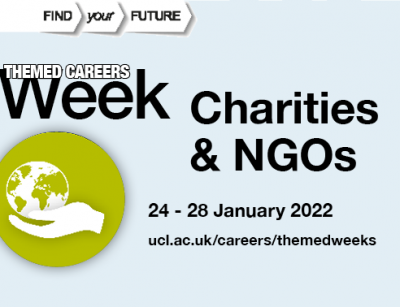Equality and diversity are top priorities for Charity and NGOs recruiters
Student Jamie Davis shares discoveries from an event with senior managers and experts in the Charities and NGO sector.

3 February 2022
The charity and NGO sector is crying out for enthusiastic new recruits. Many of us discovered this at a UCL Careers online event featuring a panel of experts from the charity and NGO sector.
The session explored the perspectives of senior managers from a range of organisations, including Clare Addy of Causeway Education, Mark Jacobs of SEED Madagascar and Paola Hanks of Leonard Cheshire. We also heard directly from Philippa Randle of Charity People and Craig Pemblington of Charityworks who are specialists in charity recruitment, providing an insight into the recruitment process and opportunities available to graduates.
Lively discussion centred around CV, cover letter and application tips followed by a Question and Answer (Q&A) that raised key issues faced by students wishing to start a career in the sector.
Equality and diversity prioties
Equality and diversity are a priority for charities and NGOs in their recruitment drive.
There was a consensus amongst the panel that your family, educational or ethnic background should not be a barrier to obtaining your dream job.
Craig stated that, since joining charity works six years ago, the recruitment drive amongst the BAME community has increased their representation from 6 to 37%.
Phillipa stressed the sector’s ongoing drive to make recruitment processes more inclusive so that your abilities, not background determine your suitability for the job.
Other panel members explained how anonymised, clear and concise CVs and a transition from cover letters to a series of focused online questions make the process simpler. Charityworks (offering 12-month charity placements to upskill graduates) has also removed psychometric tests from application forms citing issues with unconscious bias.
Exploring the recruitment process
Our discussion wasn’t just about the technicalities of the recruitment process, Clare and Mark explained the ways in which you can stand out in a competitive jobs market.
Both charity managers stated the importance of proving your passion for the cause that the charity is concerned with. This can be achieved by using confident personal statements and CVs to frame your interviews and captivate prospective employers.
Paola stressed the value of building up a body of voluntary experience, not just for your CV but for its highly rewarding nature.
“Lived experiences” were the buzzwords of the event; there was unanimity that all experience is good experience, by demonstrating transferable skills you can prove your suitability.
You may even find a specific role that fits your degree or career interest such as marketing within the charity and NGO sector.
Increasing remote opportunities
The Q&A uncovered challenges faced by international students wishing to pursue a career in the UK charity and NGO sector, namely the visa and immigration system.
Cash-strapped charities often find it hard to sponsor international students’ visas, so apply early when you still have a right to work and visit UCL Immigration and Visas for advice.
Mark, however, expressed the way in which COVID-19 has enabled more remote working, citing his “virtual office” and Canada-based colleague.
Increasingly, remote opportunities are becoming a popular option. All in all, the sector is a diverse and expanding recruiter with long-term, short-term, voluntary and paid roles available, so get applying!
Missed the event, or want to recap? View the recording.
 Close
Close


